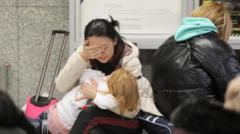Reports indicate a troubling rise in anti-Ukrainian sentiment in Poland, where refugees are facing bullying and discrimination, particularly among schoolchildren. Activists warn that the upcoming presidential election has exacerbated these feelings, and a shift in public opinion could impact the millions of Ukrainians who have sought refuge in Poland since the onset of war.
Rising Anti-Ukrainian Sentiment Poses Challenges for Refugees in Poland

Rising Anti-Ukrainian Sentiment Poses Challenges for Refugees in Poland
Ukrainian refugees in Poland are experiencing increased bullying and xenophobia, reflecting a shift in public sentiment against them as the country approaches a polarizing presidential election.
---
As Ukrainian refugees settle in Poland, a concerning increase in anti-Ukrainian sentiment is emerging, igniting fears among the displaced community. Svitlana, a Ukrainian mother, shared her daughter's previously pleasant experience at school has soured, with incidents of bullying and xenophobic remarks becoming alarmingly common. "She came home crying," recounts Svitlana, detailing how her daughter faced ridicule for speaking Ukrainian after a missile struck their hometown in Ukraine, a traumatic experience that heightened her emotional distress.
At least 2.5 million Ukrainians currently call Poland home, making up nearly 7% of the country's total population, as they flee the ongoing conflict. Initially, Polish citizens welcomed the influx of refugees with open arms; however, an ongoing presidential election campaign is amplifying xenophobic attitudes. Activist Natalia Panchenko, head of the 'Stand with Ukraine' Foundation, reflects on how early compassion has shifted into a more hostile environment filled with online abuse, which is now increasingly manifesting in everyday interactions.
Recent polling reveals that public support for Ukrainian refugees has plunged significantly, with only 50% of Poles favoring their acceptance, down from 81% two years ago. This decline could partly stem from the rhetoric during the presidential race, where candidates vary in their support for Ukraine, with far-right figures promoting anti-Ukrainian narratives that resonate with certain segments of the population.
Political analyst Marcin Zaborowski highlights the complex dynamics candidates are navigating, as even pro-Ukrainian front-runner Rafal Trzaskowski tones down his support to appeal to centrist voters. Amidst this unfolding situation, misinformation spread largely via Russian propaganda channels plays a detrimental role, portraying Ukrainians as a burden to the Polish economy and society.
Displaced Ukrainian families, often coping with trauma from the war, now face added pressures from a society grappling with contradictions in its attitudes towards them. As the elections approach, both the sentiment towards Ukrainian refugees and the potential for political change remain uncertain, raising questions about the future of these individuals in Poland.
As Ukrainian refugees settle in Poland, a concerning increase in anti-Ukrainian sentiment is emerging, igniting fears among the displaced community. Svitlana, a Ukrainian mother, shared her daughter's previously pleasant experience at school has soured, with incidents of bullying and xenophobic remarks becoming alarmingly common. "She came home crying," recounts Svitlana, detailing how her daughter faced ridicule for speaking Ukrainian after a missile struck their hometown in Ukraine, a traumatic experience that heightened her emotional distress.
At least 2.5 million Ukrainians currently call Poland home, making up nearly 7% of the country's total population, as they flee the ongoing conflict. Initially, Polish citizens welcomed the influx of refugees with open arms; however, an ongoing presidential election campaign is amplifying xenophobic attitudes. Activist Natalia Panchenko, head of the 'Stand with Ukraine' Foundation, reflects on how early compassion has shifted into a more hostile environment filled with online abuse, which is now increasingly manifesting in everyday interactions.
Recent polling reveals that public support for Ukrainian refugees has plunged significantly, with only 50% of Poles favoring their acceptance, down from 81% two years ago. This decline could partly stem from the rhetoric during the presidential race, where candidates vary in their support for Ukraine, with far-right figures promoting anti-Ukrainian narratives that resonate with certain segments of the population.
Political analyst Marcin Zaborowski highlights the complex dynamics candidates are navigating, as even pro-Ukrainian front-runner Rafal Trzaskowski tones down his support to appeal to centrist voters. Amidst this unfolding situation, misinformation spread largely via Russian propaganda channels plays a detrimental role, portraying Ukrainians as a burden to the Polish economy and society.
Displaced Ukrainian families, often coping with trauma from the war, now face added pressures from a society grappling with contradictions in its attitudes towards them. As the elections approach, both the sentiment towards Ukrainian refugees and the potential for political change remain uncertain, raising questions about the future of these individuals in Poland.





















